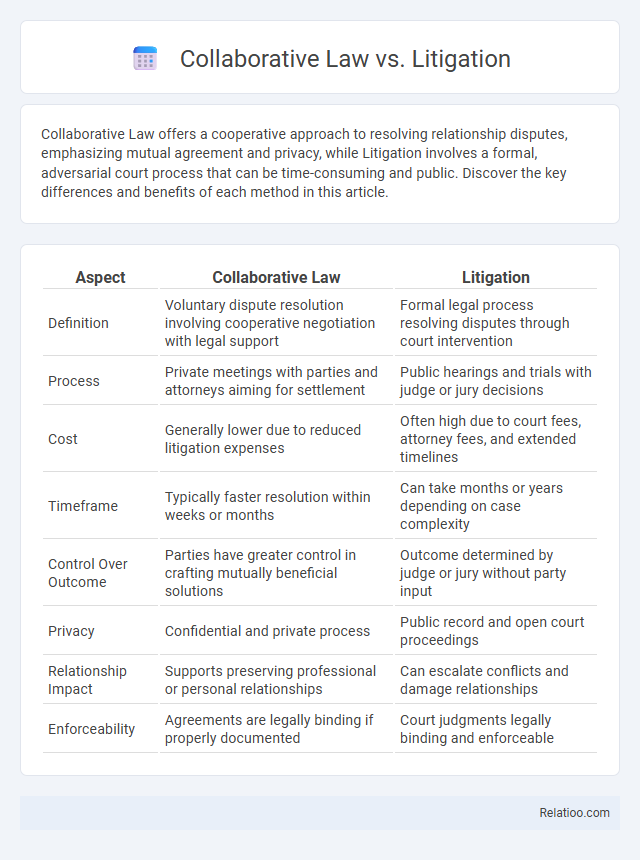Collaborative Law offers a cooperative approach to resolving relationship disputes, emphasizing mutual agreement and privacy, while Litigation involves a formal, adversarial court process that can be time-consuming and public. Discover the key differences and benefits of each method in this article.
Table of Comparison
| Aspect | Collaborative Law | Litigation |
|---|---|---|
| Definition | Voluntary dispute resolution involving cooperative negotiation with legal support | Formal legal process resolving disputes through court intervention |
| Process | Private meetings with parties and attorneys aiming for settlement | Public hearings and trials with judge or jury decisions |
| Cost | Generally lower due to reduced litigation expenses | Often high due to court fees, attorney fees, and extended timelines |
| Timeframe | Typically faster resolution within weeks or months | Can take months or years depending on case complexity |
| Control Over Outcome | Parties have greater control in crafting mutually beneficial solutions | Outcome determined by judge or jury without party input |
| Privacy | Confidential and private process | Public record and open court proceedings |
| Relationship Impact | Supports preserving professional or personal relationships | Can escalate conflicts and damage relationships |
| Enforceability | Agreements are legally binding if properly documented | Court judgments legally binding and enforceable |
Understanding Collaborative Law: An Overview
Collaborative Law emphasizes cooperative negotiation where parties and their lawyers work together to resolve disputes without court intervention, aiming for mutually beneficial outcomes. Litigation involves formal court proceedings where a judge or jury makes binding decisions, often resulting in adversarial and prolonged conflicts. Transition between Collaborative Law and Litigation typically occurs when parties decide negotiation is unproductive, prompting a shift to formal legal adjudication.
What Is Litigation? Key Principles Explained
Litigation is a formal legal process where disputes are resolved in court through a judge or jury decision, emphasizing adversarial principles and procedural rules. Key principles include the presentation of evidence, adherence to strict timelines, and the binding outcome enforced by the legal system. Understanding these elements helps you evaluate whether litigation or alternatives like Collaborative Law or Transition better suit your conflict resolution needs.
Core Differences Between Collaborative Law and Litigation
Collaborative Law emphasizes negotiation and mutual agreement through cooperative legal processes, whereas Litigation involves adversarial court battles and formal judicial decisions. You benefit from Collaborative Law's faster resolution and cost-efficiency, while Litigation often leads to higher expenses and extended timelines due to courtroom procedures. Transition between these methods depends on the willingness of parties to engage collaboratively or proceed through formal litigation.
The Role of Attorneys in Each Approach
Attorneys play distinct roles in Collaborative Law, Litigation, and Transition processes, shaping the legal experience for their clients. In Collaborative Law, attorneys act as cooperative problem-solvers, working closely with all parties to reach amicable agreements without court intervention. Litigation attorneys serve as advocates in adversarial court settings, representing Your interests through formal pleadings and courtroom strategies, while in Transition approaches, attorneys guide clients through changes in legal status or arrangements, emphasizing negotiation and adaptability to facilitate smooth adjustments.
Conflict Resolution Processes Compared
Collaborative law emphasizes cooperative negotiation and mutual problem-solving to avoid court battles, minimizing emotional stress and legal costs in conflict resolution. Litigation involves formal court proceedings where a judge determines the outcome, often resulting in longer timelines, higher expenses, and increased adversarial tension. Transition processes blend elements of mediation and negotiation to facilitate smoother adjustments, empowering your ability to reach flexible, personalized agreements outside traditional courtroom settings.
Time and Cost Implications: Collaborative Law vs. Litigation
Collaborative Law significantly reduces time and cost compared to traditional litigation by promoting cooperative negotiation and avoiding lengthy court procedures. Litigation often involves extensive discovery, court hearings, and legal fees that increase both the duration and expenses of resolving disputes. Your choice of Collaborative Law can lead to faster settlements and more predictable costs, optimizing resources during conflict resolution.
Privacy and Confidentiality: What Clients Should Know
Collaborative law prioritizes privacy and confidentiality by keeping all discussions and documents strictly between parties and their lawyers, avoiding public court records. Litigation involves public court proceedings where sensitive information may become accessible to third parties, potentially compromising your privacy. Transitioning between these approaches requires careful consideration of how confidentiality protections differ, ensuring your private information remains secure throughout the dispute resolution process.
Impact on Relationships and Emotional Wellbeing
Collaborative Law fosters cooperative communication and mutual respect, significantly reducing emotional distress and preserving relationships compared to traditional Litigation, which often escalates conflict, creating long-term animosity and stress. Transition-focused approaches emphasize emotional support and adaptive strategies to help parties navigate change smoothly, minimizing psychological harm and promoting healthier post-resolution dynamics. Choosing Collaborative Law or Transition methods over Litigation can lead to improved emotional wellbeing and sustained interpersonal connections.
Ideal Situations for Collaborative Law or Litigation
Collaborative law is ideal for couples seeking amicable resolutions in divorce without court intervention, prioritizing privacy, mutual respect, and customized agreements. Litigation suits cases involving high-conflict parties, complex legal issues, or when one party is uncooperative, ensuring enforceable court decisions. Transition strategies blend both processes but are less effective when emotions run high or speedy resolution is critical.
Choosing the Right Path: Factors to Consider
Choosing the right path between collaborative law, litigation, and transition depends on factors such as the level of conflict, communication willingness, and desired control over outcomes. Collaborative law suits parties seeking cooperative negotiation with professional support, while litigation involves court intervention suited for high-conflict disputes requiring legally binding decisions. Transition options focus on gradual adjustments, ideal for mutual agreements emphasizing flexibility and preserving relationships.

Infographic: Collaborative Law vs Litigation
 relatioo.com
relatioo.com